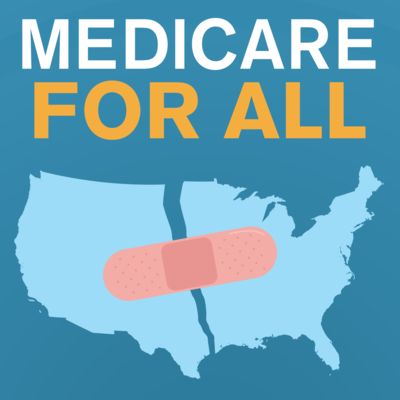episode 20: US Mail Not for Sale: The Fight for the USPS
This is how intertwined the Medicare for All and public mail movements are: if we had a national single payer system in place for the last decade, the USPS would be running a surplus. Steve DeMatteo of the American Postal Workers Union joins us to discuss the surprising connections between the postal service and our healthcare system, the political and financial obstacles that the USPS has faced under the Trump administration, and also how you can fight to protect this vital public service. Show Notes This week we welcome to the podcast Steve DeMatteo from the American Postal Workers Union (APWU)! The postal service has become crucial for our democracy during the COVID pandemic, as many voters shift to using mail ballots for safety concerns. TOTALLY COINCIDENTALLY, the Trump administration has also attempted to undermine and privatize the postal service in the run-up to the November elections. We invited Steve on to talk about the important and, for most people, surprising ways in which protecting our public postal service and establishing healthcare as a right are intertwined. The APWU and its President Mark Dimondstein are among the leading advocates for Medicare for All in the labor movement. Why? As Steve says, postal workers are in a similar position to many workers. Although the APWU has won fairly good health benefits for their members, the rapidly rising costs of healthcare are brought to the table by their employers (the postal service) every contract, and used as a counterweight for winning decent wages and other important benefits for postal workers. What is the scale of the United States Postal Service (USPS), and how is it different from private mail companies like UPS or FedEx? The postal service employs more than 600,000 workers across the country (second only to Amazon as a national employer!), at 30,000+ post offices around the country. The USPS is also the largest civilian employer of veterans in the country. It is the only service explicitly mentioned in the U.S. Constitution, and the USPS actually predates the Constitution - in 1775, Benjamin Franklin served as the first Postmaster General. In contrast to this history, in which the USPS has served as an integral part of American life since the country's founding, for-profit mailing companies like UPS or FedEx operate on a very different model. USPS service is universal, and does not charge discriminatory rates depending on whether you're rich or poor, or whether you live in an urban or rural area. For-profit mailing companies, like healthcare corporations, will not mail to unprofitable areas, and will charge every consumer as much as they can. In fact, about 25% of mail sent by UPS and FedEx are dropped off to a public post office for the final leg of your delivery - since for-profit mailing companies won't service the final address! (See this IPS study on how 70 million Americans are up-charged by UPS and FedEx because they don't live in a major city.) Now that we understand what the postal service is, how do we explain the fact that the USPS has struggled financially in recent years - even before coronavirus? Most people will never hear about it, but almost all of the USPS's losses stem from a 2006 law called the "Postal Accountability and Enhancement Act," which required the postal service to pre-fund retiree health benefits 75 years in advance (!!!). That means the USPS has to pay, right now, for the health benefits of future USPS retirees who haven't even been born yet. No other government agency, and certainly no private corporation, has to pre-fund their healthcare benefits three generations in advance, and it created an impossible financial situation. If you read or watch mainstream news on why the postal service has struggled financially, though, you will never hear about this 2006 law. The reason the press overlooks the reality of the postal service's struggles is due to a concerted effort to demonize the USPS...
